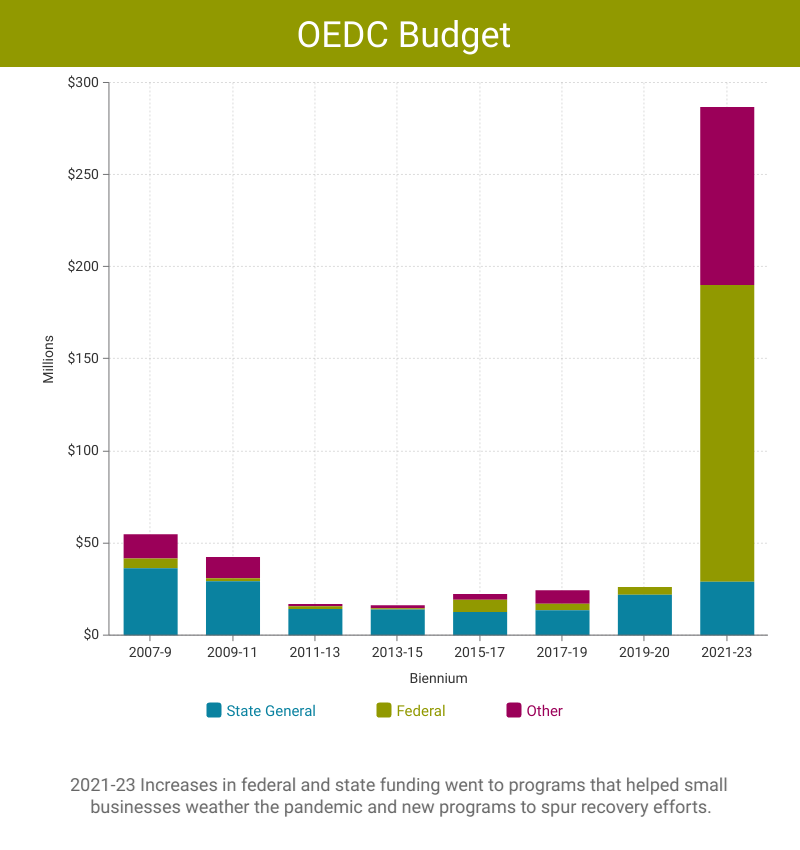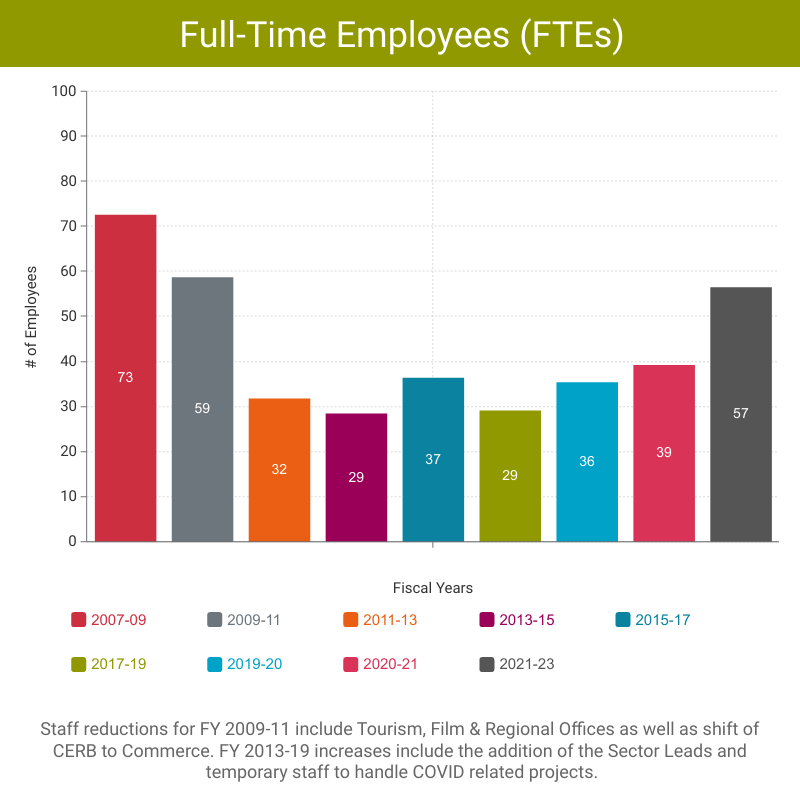2022 OEDC Stakeholder Report
This report to the economic community is intended to highlight the work of the Office of Economic Development & Competitiveness (OEDC) between Jan. 1, 2018 and Dec. 31, 2022. Where possible, the data covers approximately five years of activity to reflect the long-play nature of economic development, where efforts to strengthen communities statewide can take years to have an impact.
Where applicable, explanatory notes and additional data are provided to more completely and transparently tell the story of economic development at the state, regional and local level.
The OEDC strengthens communities by providing businesses with the solutions they need wherever they are in the business lifecycle, from ideation to exit strategies.
Our work is supported by a large network of economic partners throughout Washington to build a robust, diverse and stable economy, focusing primarily on businesses in rural and historically underserved and underrepresented communities. This includes Commerce’s Small Business Resiliency Network, associate development organizations (ADOs), Small Business Development Centers, SCORE offices and other state and federal agencies.
The OEDC is aligned along five core economic development strategies: Business Development, Export Assistance, Key Sectors, Small Business Finance and Community Outreach, and Training, Education and State Marketing Services. The teams within these units are focused on:
- Underserved & Rural Economies: The OEDC and its many partners work together on the Washington Small Business Training & Education Center to support the evolving needs of entrepreneurs, startups and small businesses throughout the state. The MyStartup365.com website offers a progression of programs and services designed to build competencies and skills throughout the five stages of a business: Think, Form, Launch, Grow and Optimize. The goal is to provide universal access to the same skillsets, resources, education and training to allow any resident to successfully start, own and operate a business, even in the smallest of communities.
- Business Recruitment & Investment: By developing, curating and responding to leads from global consultants and investors, the OEDC focuses on business attraction and investment activities so businesses worldwide will actively consider Washington State for their expansion activities. The team also focuses on business retention and expansion support for companies already doing business in the state.
- Key Sectors: Working closely with the Governor, legislators, industry and the private sector, Sector Leads represent the state’s high-growth industries – Aerospace, Aviation & NewSpace, Clean Technology, Creative Economy, Forest Products, Information & Communication Technology (ICT), Life Science & Global Health; Maritime; and Military – as well as new innovation clusters. The focus of this programs is forging and promoting public-private partnerships, enhancing the workforce for the 21st century in targeted, high-growth industries, and advancing broad stroke strategies that support small business growth and expansion statewide.
- Promoting Washington State: The OEDC manages the state’s promotional arm, in terms of attracting visitors and businesses to Washington State using traditional and digital strategies, including marketing, social media, websites, collateral and messaging to demonstrate why visitors and business owners should choose Washington. The OEDC also serves as the state’s conduit to promoting tourism through the Washington Tourism Marketing Authority.
- Small Business Finance and Community Support: This new group is charged with developing innovative loan programs that are targted to small businesses that are often unable to attain traditional funding from financial institutions. The unit also oversees the many pandemic-related grant programs the OEDC has been responsible for.
- Export Assistance: This team provides technical, financial and international marketing assistance to small businesses to drive increased export sales statewide. This includes administered federally-funded Export Vouchers which offset some of the cost for a small business that wants to engage in international activities such as trade shows or market expansion. In response to the pandemic, the Small Business Export Assistance team shifted their efforts to online webinars to teach exporting competencies and participated in virtual trade shows that were held in place of physical ones in Europe and Asia.
The Office of Economic Development & Competitiveness works with businesses all over the world and all over the state to strengthen and diversify the economy, prepare the workforce of tomorrow, help small businesses become large ones and position the state to weather major economic disruptions caused by shifting policies, world politics and economic shifts. The OEDC partners with economic development organizations throughout the state to leverage assets and maximize ROI.
Highlights of the OEDC’s work over the last five years include:
- 81 new, retained or expanded businesses, 34.5% of them in rural and underserved parts of the state.
- 15,844 new or retained jobs across the state.
- $2.73 billion in new or continued capital investment in Washington’s economy.
- 1,138 small businesses awarded STEP grants to expand into new markets overseas.
- STEP export voucher program to localize their websites and develop e-commerce platforms, identify foreign buyers via B2B matchmaking meetings, attend foreign trade shows and missions, participate in export training, perform compliance testing for entry into an export market, develop international marketing materials, and other services.
- 3,976 small businesses assisted with export issues related to tariffs, paperwork, foreign trade zones and reseller permits.
- $1 billion in new export sales from participation in international trade shows as part of the Washington State delegation.
- 1,226 small businesses have gone through the state’s ScaleUp program that provides essential skills to business owners to remove roadblocks to further growth.
- 166,900 unique visitors to the state’s business attraction site in 2022, resulting in 448,181 page views, an increase of 28% over 2021.
- 116,724 visits to MyStartup365.com, the state’s Small Business Training & Education site. The site’s traffic has increase 10 fold since pre-pandemic levels, thanks in large part to the addition of new content and programs.
- 100 businesses, mostly in historically marginalized communities, received Go Global grants to help them improve their online presence, add ecommerce or further strengthen their digital marketing strategies.
- Serving as the lead agency on major economic recovery initiatives to ensure an economy that is equitable, inclusive and diverse, helping small businesses start, restart and rebuild, particularly in rural and historically underserved communities, and positioning the state to seize opportunities in emerging clusters and key sections, including commercial space, clean energy, artificial intelligence, quantum computing, and unmanned and autonomous vehicles.
- Sponsoring dozens of trade shows and trade missions (most virtually, due to the global pandemic), that expose the state’s small businesses to overseas markets and opportunities, including the Paris and Farnborough Air Shows, Hannover Messe, Mobile World Congress and MEDICA.
- Commerce has 11 overseas trade representatives covering 23 countries. Throughout the pandemic, this network of consultants has been critical to connect Washington companies with potential customers/partners/distributors and help small businesses explore new export opportunities.
As the pandemic spread, the OEDC pivoted its operations to meet the needs of small businesses affected by phased orders and public health concerns. This new body of work included new tools and programs to help existing small businesses survive and rebuild in the economic recovery phase as well as start anew, either as a current business owner or as an entrepreneur. This included the Working Washington grants, which provided stop-gap assistance to thousands of businesses across the state.
Pandemic response work included:
- Round One: $10 million, supported 1,508 businesses.
- Round Two: $10 million, supporting 1,574 businesses.
- Round Three: $100 million, supporting 7,931 businesses.
- Round Four: $240 million, supporting 11,727 businesses.
- Round Five: $75 million, 60% set aside for arts, heritage and science sectors.
- Hospitality & Lodging Grants: $100 million in relief grants to industry businesses negatively impacted by COVID-19 Pandemic.
- Resiliency Round: $18 million; supported 2,646 small businesses.
- Awarding $300,000 in relief grants to 43 shellfish growers.
- Grants for craft beverage establishments, shellfish growers, farmers markets and agritourism: $16 million, supported 839 small businesses.
- Creating the state’s Economic Recovery Dashboard.
- $10.6 million in grants from the Economic Development Administration for the tourism industry to rebuilt and recover. $3.5 million of these funds went to 286 festivals and events in 36 of 39 counties to restart in 2022.
- Securing a $15 million federal grant from the EDA for a package of Safe Start projects.
- Coordinating the production of PPE supplies when hundreds of manufacturers answered Governor Inslee’s call to retool to make PPE. Commerce staff and loaned executives from Impact Washington helped these companies pivot to produce everything from hand sanitizer to face shields and masks.
- Expanding ScaleUp program to provide free training and support to 1,175 small businesses trying to navigate the pandemic.
- Creating a COVID Business Planner to help businesses scale or suspend operations in response to phased health orders as well as resiliency planning for eventual reopening.
- Revamping Commerce’s small business website to focus on COVID-related content and expanded disaster planning and COVID specific content on Commerce’s website.
- Pivoting more than 30 staff members in Commerce to manage and process Working Washington grants, including reviews of tens of thousands of applications and processing payments to recipients and answering several thousand calls and emails from small business owners and nonprofits.
- Creating and conducting dozens of virtual export webinars and B2B meetings to help businesses maintain growth through successful exporting strategies.
Staffing & Budget

